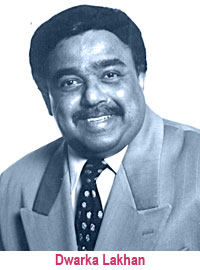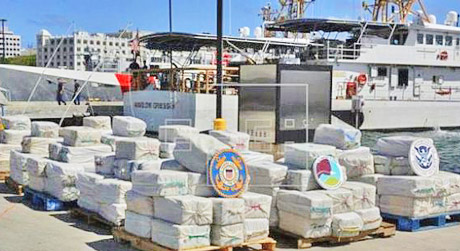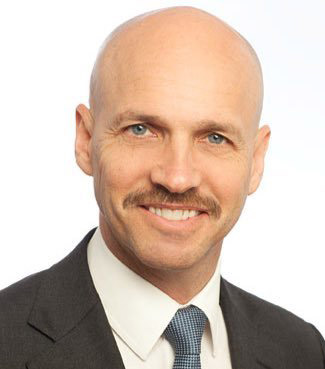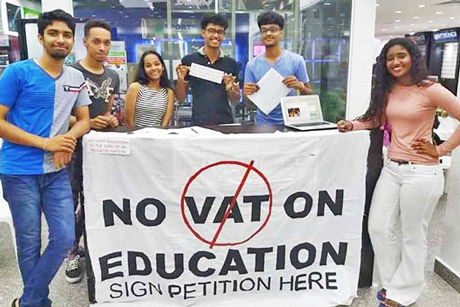Guyana Focus
in the spotlight

The Caribbean region currently imports an unsustainably high US$4.6 billion in foreign foods, spurring calls from a wide cross section of the population, as well as international agencies, to replace foreign food imports with locally grown produce.
With Guyana having the largest land mass in the region and the greatest comparative advantage in agriculture it is in an ideal position to displace a significant portion of food imports to its own advantage.
Incidentally, both the World Bank and the IMF see a future for Guyana that is tied to agriculture. According to a World Bank report, “Guyana: Development Policy Review”, Guyana should diversify its agriculture base into crops that that can be produced competitively for exports. “The country produces a wide variety of fruits, vegetables and other crops, many of which, if grown with modern technology, have (good) market prospects…,” states the report.
In addition, another IMF assessment of Guyana’s states that: “Guyana’s future economic growth and poverty reduction depend heavily on agriculture and rural development.”
But first, Guyana would have to strive to satisfy its own domestic demand for food – the cost of which has grown dramatically over the past decade.
For Guyana to succeed in its quest to become the Caribbean’s main food supplier, it will have to deal with the sector’s long-standing problems as well as obtain the commitment of its regional counterparts to support its plan.
In recent years, the region has become more conscious about food security but regional commitment has been weak at best, although Guyana can be credited with raising awareness about the importance of agricultural development for regional food security.
From a regional perspective, the lack of capital to support infrastructural works and large-scale expansion initiatives has been a perennial problem. Dependency on funds from international financial and sector-specific institutions has been too great, engendering the need for more private sector participation.
Arguably, the decline in global inflows of funds to the region does not bode well for the development of agriculture. Addressing this problem would require the implementation or enhancement of national/regional incentive programs that would be sufficiently attractive to foreign investors. The individual countries must bear in mind that competition for scarce funds is fierce and consequently they cannot take a nonchalant approach in designing incentive programs and developing strategies to attract investors.
The funding problem is compounded by weak national budgetary commitments to the sector. Evidently, verbal commitments to developing agriculture have not been matched by funding to support its growth. In many cases, funding priority has been given to the social and service sectors, relegating agriculture to the back burner.
Nationally, deficiencies in the planning process do not facilitate confidence among investors that governments have well-defined, sustainable strategies to develop agriculture. There have been a lot of “cheap talk”, “idle pronouncements” and “long wish lists” that are not supported by well-thought out plans.
Historically, the region has had heavy reliance on the export of primary commodities which suffer from the vagaries of global supply/demand and pricing; relatively uncompetitive cost of production structures; dwindling preferential tariffs from traditional importers; shifts in demand for primary products resulting from growth in the use of substitute products; and changes in global consumption patterns, which have all had a detrimental impact on the growth of the sector.
Arguably, countries like Guyana have been trying for years to reduce their dependency on traditional primary exports and expand their economic base by diversifying into “new growth” areas. However, there has been weak integration of implementation efforts, resulting in sporadic ventures that engender limited success.
In the case of agro industry – canning, bottling, packaging and manufacturing - there has been a lack of capital investment and in the case of existing facilities, inconsistent supply of inputs for processing. In many instances, output has been affected by the vagaries of weather and diseases, which have led to supply/demand shortfalls and consequently manufacturing downtime; and on the other hand by periods of seasonal glut. This has had a negative impact on exports whereby contractual supply arrangements have not been fulfilled; as well as resulted in inefficient domestic plant operations and the creation of white elephant projects.
Another related problem is scale of operations which has not allowed for sufficient output for exports or for agro-processing – although scale might be addressed with new large scale private investments. There is also need for improvement in the co-ordination of farm to factory supply and the establishment of formal mechanisms that ensure the processes put in place actually work.
Other problems that must be addressed include standardization of quality, especially for the export market. In addition, insufficient transportation and storage of perishable crops have caused farmers substantial losses, giving rise to the need to establish adequate facilities such as refrigeration and transportation to support farm to market activities.
When assessing scope in the sector, it is imperative to examine the potential to leverage linkages to established industries. Backward and forward linkages between the base and satellite industries can provide a competitive advantage and offer greater control over the growth of offshoots of traditional industries.
One of the major deterrents to regional food production is the preference for foreign goods, which ultimately limits the expansion of domestic industries. Local industries should be given some form of protection to develop as part of a feasible business strategy, for them to prosper.
Echoing a sentiment that this column has long advocated, Dr. Lystra Fletcher-Paul, Caribbean sub-regional Director of the Food and Agriculture Organization last year called on Caribbean nations to seriously consider restricting the importation of certain foods once they are in a position to produce healthier substitutes.
She noted that there is room in global trade rules administered by the World Trade Organiztion to allow for countries to impose restrictions on certain foods but Caribbean governments fail to take advantage of these restrictions.
Fletcher-Paul also cautioned Caribbean residents that they “are eating themselves to death with imported foods.” She noted that because of the inconsistency in food supply, importers find it easier to import food, much of which is in the form of unhealthy processed foodstuff which is high in salt, sugar and oils – resulting in non-communicable diseases such as diabetes, heart disease, hypertension, high rates of obesity and some forms of cancer. These diseases, she surmised, could be minimized through the consumption of locally produced foods.
While most of the problems of agricultural development in Guyana are definable and controllable, those related to natural disasters are uncontrollable. However, appropriate measures that mitigate the underlying risks can be put in place but require substantial capital investments.
At the end of the day, serious commitment and planning devoid of political rhetoric will allow Guyana to leverage its advantage in the quest for regional food security.

Four unnamed Guyanese were arrested aboard the fishing vessel, Lady Michelle, and taken to Puerto Rico.
Authorities seized the drugs from a boat off South America’s northeastern coast, the U.S. Coast Guard said on Monday.
About 4.2 tons of cocaine, with an estimated street value of $125 million, was confiscated from a fishing boat in international waters off Suriname, said Ricardo Castrodad, a spokesman for the U.S. Coast Guard in San Juan.
It was the largest cocaine bust since 1999. Photos provided by the coast guard and US Drug Enforcement Agency show stacks of the white substance piled up after seizure.
The 70-foot long fishing vessel was stopped and searched by authorities February 16 during a joint patrol by the crews of the U.S. Coast Guard cutter Joseph Napier and the coast guard of Trinidad and Tobago, Castrodad said.
The crew of the Napier, which is based in Port Canaveral, Florida, towed the fishing vessel, the Lady Michelle, to St. Vincent and four men on board from Guyana were taken to the U.S. Virgin Islands to face criminal charges.
The coast guard took the cocaine to Puerto Rico and turned it over to the U.S. Drug Enforcement Administration.
‘As the cocaine flow from South America continues to increase, law enforcement partners in the Eastern Caribbean Region have to increase our collaborative efforts in order to effectively respond to the threat,’ the DEA’s assistant special agent in the Caribbean, James Doby, told Agence EFE.
‘Such collaborative efforts are currently underway in the Caribbean Corridor Strike Force, where law enforcement partners are collocated every day,’ he said.
Last week, U.S. agents confiscated cocaine during a routine operation in Caguas, Puerto Rico which was estimated to have a street value of $14 million.

U.N. spokesman Stephane Dujarric announced the appointment of Dag Halvor Nylander as Guterres’ personal representative “with a strengthened mandate of mediation.”
Dujarric said on December 16 that then-Secretary-General Ban Ki-moon and Guterres, who succeeded him on January 1, had agreed that the U.N. chief’s use of his “good offices” to resolve the dispute, which started in 1990, would continue for a final year until the end of 2017.
If Guterres concludes that no significant progress has been made by that time, Dujarric said the Secretary-General will refer the issue to the International Court of Justice for settlement – unless the governments of Guyana and Venezuela jointly request him not to do so.
The dispute has its origins in the “Arbitral Award of 1899,” a decision on the frontier between Venezuela and what is now Guyana.
Venezuela contends the decision is null and void and claims about 40 percent of Guyana’s territory, which is rich with gold, diamonds, timber and other natural resources. Guyana, which is much smaller, rejects the claim and is pressing the U.N. to take the case to the International Court of Justice.
Dujarric said Nylander “will actively engage with the governments of Guyana and Venezuela with a view to exploring and proposing options for a solution to the border controversy between the two countries.”
Trained as a lawyer, Nylander was Norway’s special envoy to the Colombia peace process from 2012-2016 and headed the country’s mission in the South American nation from 2006-2008. He previously served at Norway’s U.N. Mission in New York and its embassy in Buenos Aires.
The appeal was unanimously dismissed by retired acting Chancellor Carl Singh, acting Chief Justice Yonette Cummings-Edwards and, High Court Judge Brassington Reynolds.
The panel upheld the decision of then Chief Justice, Ian Chang, which said that cross-dressing in Guyana was legal, unless it was done for an improper purpose. There was no clarification on what constitutes an “improper” purpose.
The court said today that it is not for the court of law to define what Parliament has not. The Summary Jurisdiction Act which criminalised men and women, presenting themselves in attire of the opposite sex, came into effect in 1893.
Attorney-at-Law representing the appellants, Arif Bulkan, said the ruling now means the court has free reign to determine what constitutes an improper purpose on a case by case basis.
The case which was initially filed in February 2010, following the widely reported arrests and convictions of seven trans persons for the 1893 summary offence of ‘being a man’ and wearing ‘female’ attire in a public way or public place, for an ‘improper purpose.
The McEwan case argues that the archaic cross-dressing law, found in section 153 (1) (xlvii) of the Summary Jurisdiction (Offences) Act 1893, is inconsistent with the Guyana Constitution.
Representatives of the Society Against Sexual Orientation Discrimination (SASOD) and the Guyana Trans United (GTU), who were in court expressed disappointed and said a statement would be issued later.
Chancellor Singh told the court an improper purpose would be a man who presents himself in female attire, enters a taxi and robs that taxi.
GECOM Chairman
A statement from the PPP follows:
The People’s Progressive Party (PPP) has examined the interpretation of Article 161 (2) of the Constitution of Guyana, proffered by Attorney General, Basil Williams, in the recently concluded engagement with Cde Anil Nandlall and Priya Manikchand. While we do not agree with Williams’ interpretation, we recognise that he has finally conceded that Article 161 (2) of the Constitution qualifies two categories of persons for the positon of Chairman of the Guyana Elections Commission (GECOM), namely: Judges, former Judges and person qualify to hold the position of Judges AND, or any other fit and proper persons.
However, in our view, the Constitution does not accord any preference whatsoever to one of these categories of persons over the other as Williams contends. Neither the letter nor the spirit of the Constitution confers such a bias. We are of the firm view that persons from either of these categories are equally qualified for the position of Chairman of the Guyana Elections Commission (GECOM). Our position is consistent with the historical evolution of this particular Article of the Constitution, as well as, the qualities and qualifications of the persons who have held this position since this Article came into force.
Notwithstanding and in the interest of moving the process forward, today, the Leader of the Opposition wrote to the President requesting some additional clarifications and informed him that six (6) names will be submitted to him shortly in accordance with Article 161 (2) of the Constitution.
With the announcement of Surujbally's retirement last year a sharp difference of opinion surfaced between the Government and the Opposition on the process used to select a new Chairperson. At the core of the matter is interpretation of the Constitution with regard to the qualifications and merits of the candidates, specifically Article 161 (2) of the Constitution.
Article 161 (2) of the Constitution states "... the Chairman of the Elections Commission shall be a person who holds or who has held office as a judge of a court having unlimited jurisdiction in civil and criminal matters in some part of the Commonwealth or a court having jurisdiction in appeals from any such court or who is qualified to be appointed as any such judge, or any other fit and proper person, to be appointed by the President from a list of six persons, not unacceptable to the President, submitted by the Leader of the Opposition after meaningful consultation with the non governmental political parties represented in the National Assembly."
In keeping with the requirement of the Condtitution, a list of candidates was submitted by Opposition Leader, Bharrat Jagdeo, but was rejected by President David Granger. The list nominated the following persons Lawrence Latchmansingh, Rhyaan Shah, James Rose, Norman McLean, Ramesh Dookhoo and Christopher Ram.
President David Granger rejected the list as there were no judges among the names submitted.
The opposition argued that there are two categories of persons who would qualify according to the Constitution: (1) A High Court judge or an Appellate Court judge, a former High Court or an Appellate Court judge or (2) any “fit and proper” person. Further, the opposition pointed out that this is the first time that a President has rejected such a list since the Carter Formula for the appointment of the Chairman of GECOM was initiated in 1992.
The Opposition spokesperson Anil Nandlall pointed out that of past GECOM Chairpersons, only Mr Doodnauth Singh (SC) appeared to have satisfied the requirements of the first category, whereas the other past commissioners – Rudy Collins, Edward Hopkinson, Joseph Singh and Dr. Steve Surujbally – lacked legal qualifications and were therefore selected under the “fit and proper” requirement.
There has since been many back-and-forths between the government and opposition sides on the question of interpretation of Article 161 (2) of the Constitution ending with a meeting on Monday between Minister of Legal Affairs, Attorney General Basil Williams for the the Government and Nandlall and Priya Manickchand, on behalf of the Opposition.
At this meeting the Opposition representatives were presented a copy of the government’s response focusing on Nandlall's rejecction of the ejusdem generis rule proffered by the government as applying in Guyana.
The response reads: “Mr. Nandlall has advanced the argument that the ejusdem generis rule of construction does not apply in Guyana. This position is erroneous. However, before refuting Mr. Nandlall’s misguided argument it is instructive to set out what is the ejusdem generis rule.”
According to the AG, the ejusdem generis rule says that general words which follow two or more particular words in an act must be confined to a meaning of the same class as the particular words.
“The intention is to cover a wide range of similar circumstances by first creating a genus, category or class that is two or more examples, followed by a general expression which has the effect of extending the operation of the statute to all particular circumstances which are within the genus created. In this way, the statute does not need to list all relevant examples.”
Williams cited a number of local and international cases to back his arguments.
“The rule is a facet of the principle of the latin maxim, noscitur a sociis, which contemplates that a statutory term is recognised by its associated words. Therefore, when general words are juxtaposed with specific words, general words cannot be read in isolation. Their colour and their contents are to be derived from their context.”
Williams noted that the persons eligible to be Chairman of the Elections Commission according to Article 161 (2) shall be a judge or a person who has held office as judge or a person who has the qualifications to be a judge, or any other fit and proper person.
“When looking at the construction of the section one can reason that the categories are in the order of preference. This order coupled with the use of the word shall (mandatory in this sense) conveys to us that the ideal person in the contemplation of the framers of the constitution is someone who falls into the first category namely, a judge or a person who has held office as a judge or a person who qualifies to be a judge.”
He said that supporting this proposition is the proviso to Article 161 (2) which states that “Provided that if the Leader of the Opposition fails to submit a list as provided for, the President shall appoint a person who holds or has held office as a judge of a court having unlimited jurisdiction in civil and criminal matters in some part of the Commonwealth or a court having jurisdiction in appeals from any such court or who is qualified to be appointed as any such judge.”
Therefore, Williams argued, the Leader of the Opposition’s list of candidates must include the persons required by the Constitution in the priority category supported by the proviso.
“A list from the Leader of the Opposition with candidates that only fit into the secondary category namely ‘any other fit and proper person’ would be an unacceptable list. Finally, it must be clearly pointed out that the President is empowered by the Article 161 (2) to deem a list acceptable or unacceptable. Further, it is the President who ultimately decides whether a candidate is fit and proper for the office of Chairman of the Elections Commission,” the AG insisted.
However, Nandlall in a separate statement of the meeting, made clear where the Opposition stood.
He said that at the meeting, rather than offer his or the Government’s interpretation of Article 161 (2) of the Constitution, as he promised on the last occasion, the AG handed over a document titled: ‘Response of Hon. Attorney General and Minister of Legal Affairs, Basil Williams, SC, MP to the Opposition’s contention on Article 161 (2) of the Constitution’.
“In this document, the Attorney General simply essayed a response to my interpretation of Article 161 (2) of the Constitution, which I left with him the last time we met. The gravamen of his presentation is that he disputes that the ejusdem generis rule of construction of statute applies to Guyana. In our view, this does not assist in resolving the matters of controversy.”
Nandlall said that, in fact, if the Opposition is to follow suit and reciprocate, it would end up creating another and new controversy. This would simply distract from the issue at hand.
He noted that in the final few paragraphs of the document, the AG simply recites Article 161 (2) of the Constitution and contends that in his view… “the ideal person in contemplation of the framers of the Constitution is someone who falls into the first category namely, a Judge, a person who has held office as a Judge or a person qualified to be a Judge… a list from the Leader of the Opposition with candidates that only fit into the second category namely ‘any other fit and proper person’ would be an unacceptable list”.
“Therefore, the Attorney General has abysmally failed to address the quintessential issue and the real crux of the matter: who qualify as/or what are the attributes of, “any other fit and proper person”. In the circumstances, the engagement with the Attorney General, as I predicted, was futile.”
on private education

Persons from School of the Nations, Marian Academy, Apex Academy and other private educational institutions from across the country were invited to the protest organized by Rosh Khan. Those attending were being asked to assemble in front of GRA with their placards.
The protest is just another action being taken by civil society demanding that VAT imposed on private education be eliminated.
During the past weeks, there have been many letters sent to the media by the leader of the Opposition Bharrat Jagdeo, Directors of Private Schools and even students attending private schools calling for the government to reverse this decision.
A statement from the Office of the Opposition Leader called on Government to cut ministerial salaries and overseas trips if they are badly in need of revenue. It said that education has long proven to be the surest way out of poverty and that taxing the service is callous and cruel. The statement also contended that imposing VAT on private education is biased, since persons attending public schools do not bear this burden.
The statement reminded that the private education system has created job opportunities for many and has contributed vastly in raising the standard and quality of education in the country. It was noted that the private education system has become a fundamental supplement to public education.
Othniel Lewis, a student of Nations Sixth Form College, has expressed concern about his future and those of his colleagues who are in the private education system. He said, “The incidence of this tax on private education will be passed on to consumers who are already making sacrifices to send their children to these private schools. I am fully aware that there is public education available but without a doubt, it has many challenges.”
“Tens of thousands of public education consumers are clearly not satisfied with public education alone since the majority of them send their children to private lessons.”
Lewis stated that there are fortunate people who send their children to private schools; there are many others who are humble and hardworking parents, who sacrifice a lot to give their children the best.
The student pointed out, “Private education provides quality, supplemental services which include quality computer laboratories, air conditioned class rooms, ample playground and yard space, and most importantly excellent teaching.”
He said that students in the public education system are confined to Caribbean Secondary Education Certificate (CSEC) and Caribbean Advanced Proficiency Examination (CAPE).
Lewis continued, “Some private schools give the opportunity to write exams like General Certificate of Education (GCE), Association of Business Executives (ABE) and Scholastic Aptitude Test (SAT). These are far more internationally recognized examinations that give students a better opportunity to compete on the international stage.”



To advertise in ICW call
Call 905-738-5005